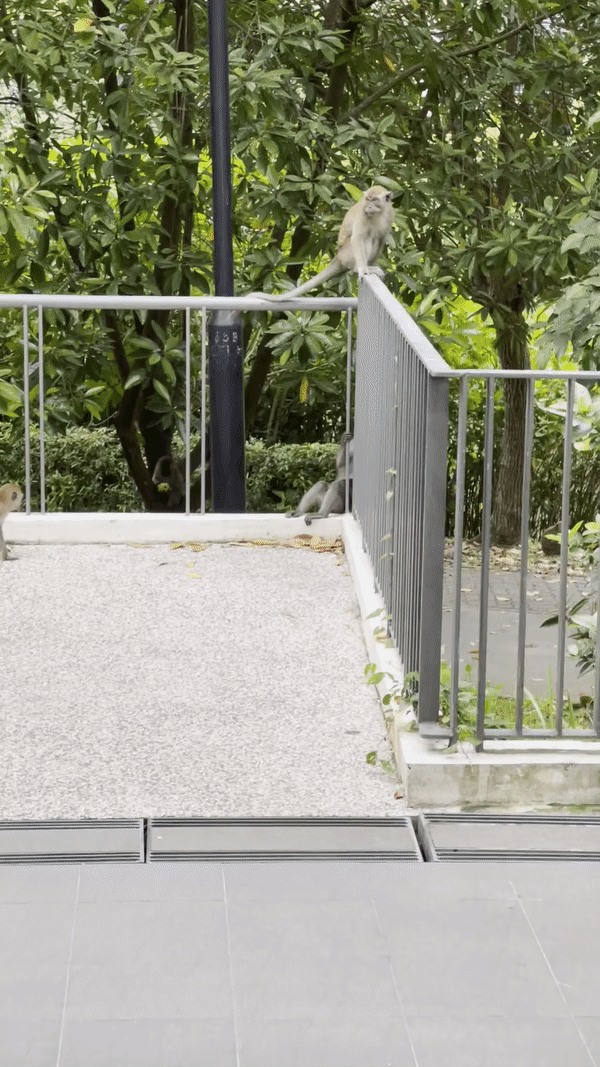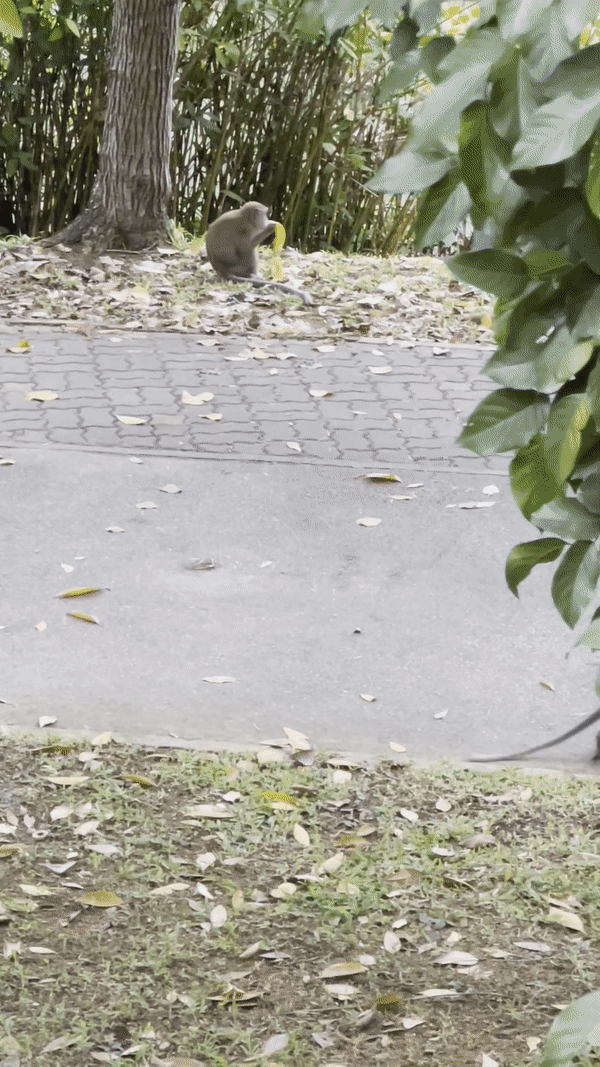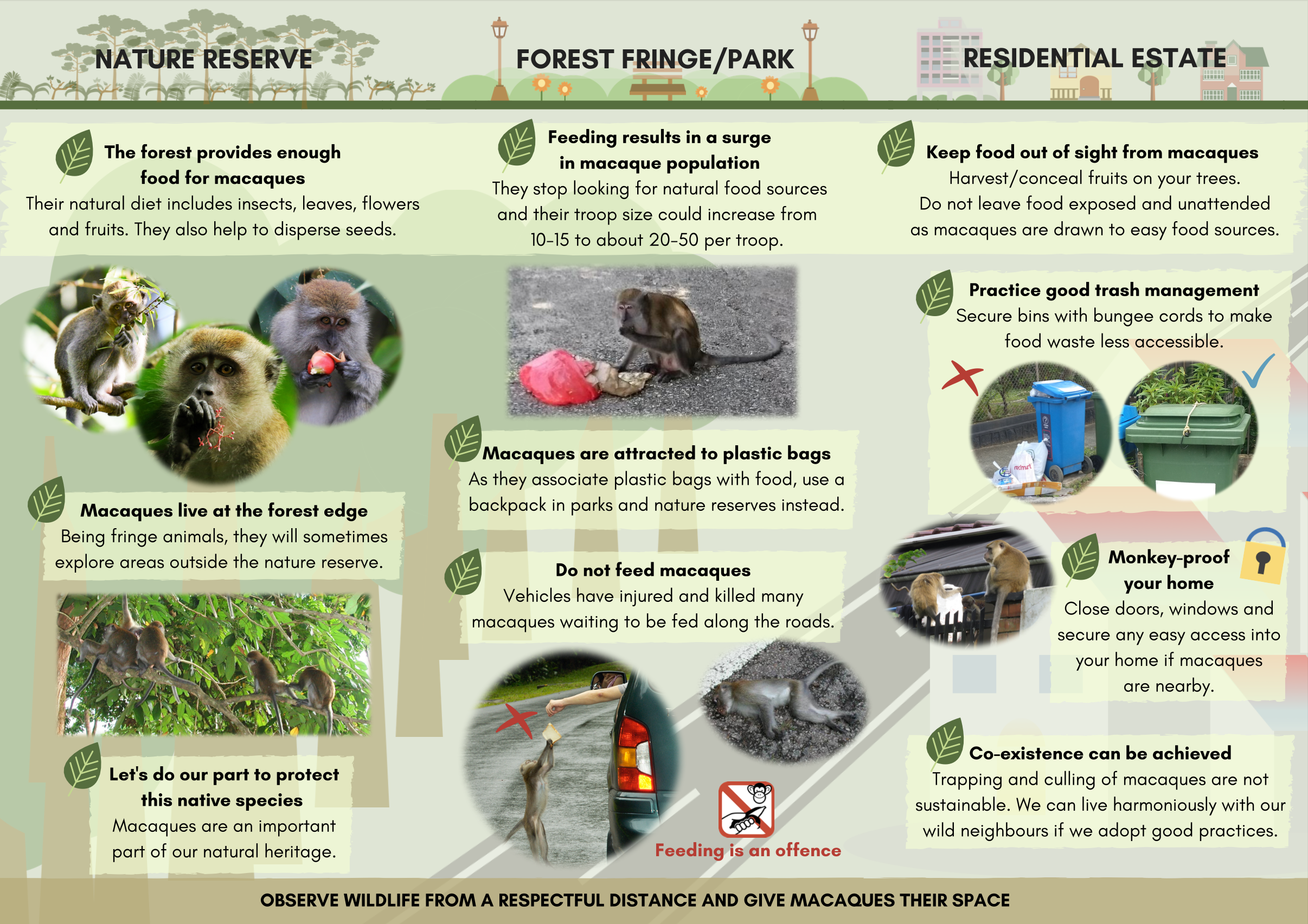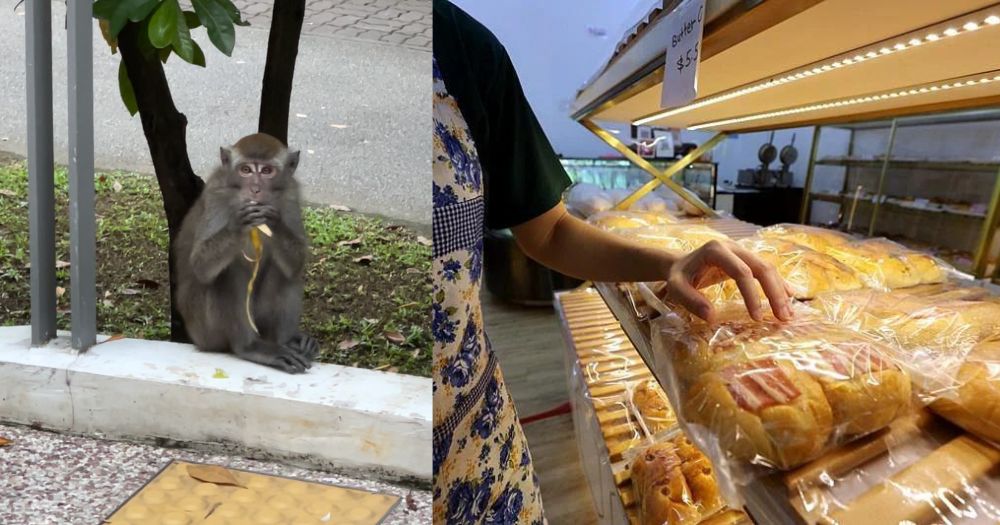Follow us on Telegram for the latest updates: https://t.me/mothershipsg
On Jul. 11, patrons and store owners at the shops of Block 658 at Punggol East were visited by an unusual group of customers.
A troop of long-tailed macaques entered a bakery and supermarket there and made off with bread and fruits.
Rise of the macaques on Jul. 11
The macaques appeared to have thought through their plan.
According to Shin Min Daily News (SMDN), one of the macaques entered the bakery first, and after it was successful in getting its hands on a freshly baked bread, others in the troop went in for the steal.
The bakery staff shared that she counted more than 10 macaques in the troop that day, which made off with a total of four pieces of bread.
The supermarket near the bakery, HAO Mart, was not spared either. The troop of macaques entered and managed to get their hands on fresh bananas.
In a video taken by HAO Mart staff Sherie Chan and shared with Mothership, a man can be seen waving a bicycle lock at the troop, causing some of the macaques to flee.
 Footage courtesy of Sherie Chan.
Footage courtesy of Sherie Chan.
That did not stop some of the macaques from enjoying their bananas though.
 Footage courtesy of Sherie Chan.
Footage courtesy of Sherie Chan.
“We had to close the shutters to keep them from coming back in,” Chan, who was working at HAO Mart on the morning of Jul. 11, told Mothership on Jul. 14.
When asked by Mothership if the macaques' antics were a frequent occurrence, a staff at the bakery shared that this was the first time it had happened since the bakery opened about four months ago, and she was stunned by the number of macaques there on Monday.
She has not seen the monkeys since their first appearance then.
Chan, on the other hand, was less shocked by the macaques. She lives in one of the HDB blocks behind the shops and frequently sees the macaques around.
When asked if there were plans to implement measures to dissuade the macaques from stealing food should they return, the bakery staff said that she was not aware of any plans by the bakery to do so at the moment.
Here's the full video Chan shared:
Increase in monkey encounters in recent years
A resident of five years at a nearby block, surnamed Tan, shared with Mothership that macaque encounters have become regular occurrences in the neighbourhood.
“I would see them once or twice a month,” she said.
“There was once I heard a ruckus downstairs where kids were shouting, and when I looked down, I saw that macaques had taken a backpack from the kids, probably searching for food,” Tan added.
Tan observed that there are more macaques in recent years, as compared to the time when she just moved to Punggol.
Though she often sees the authorities patrolling the park walkways, Tan hopes they will do something to control the macaque population.
 Forested area and new HDB estates in Punggol East are close in proximity to each other. Photo by Gawain Pek
Forested area and new HDB estates in Punggol East are close in proximity to each other. Photo by Gawain Pek
Wildlife commonly seen in the area
A passer-by who gave his name as John, and who frequents Punggol Waterway Park near the estate, was less concerned as he felt that these incidents were one-off.
He encounters the macaques occasionally on his morning walks at the park.
During Mothership's visit to the estate, there were also pre-school groups out for walks.
When asked about macaque encounters, one pre-school teacher shared that wildlife encounters were common there.
For example, she shared that they often encountered monitor lizards when bringing the kids out for a walk around the neighbourhood, so much so that some of the kids have gotten used to seeing them.
The teachers frequently share with the kids what to do if they encounter wildlife, such as not making loud noises or keeping a distance.
The macaques, however, are most often seen near Coney Island and around the Waterway Point area, the teacher pointed out.
 Coney Island in the distance, about 600m from Waterway Sunway estates in Punggol East. (Photo by Gawain Pek)
Coney Island in the distance, about 600m from Waterway Sunway estates in Punggol East. (Photo by Gawain Pek)
No macaques were spotted in the neighbourhood during Mothership's visit.
Macaque encounters not uncommon in Singapore
Singaporeans are no strangers to the long-tailed macaques.
But not all encounters are terrorising though.
According to the NParks website, while macaques naturally inhabit forested areas and mangroves, they are also forest fringe animals, which means they frequently visit their neighbouring areas to forage for food.
Having said that, macaques becoming attracted to processed food like breads are likely due to prolonged human feeding which altered their behaviour over time.
As a result, some macaques have associated plastic bags as a source of food or they may be emboldened to come close to humans and residential areas.
Wildlife management by NParks
In response to a forum letter in The Straits Times earlier in June, NParks director Dr Adrian Loo wrote that NParks adopts an "enhanced" approach which includes four main prongs: public education, community stewardship, population ecology and population management.
"NParks will work with development owners and other stakeholders to build up facility management capabilities in residential estates and better manage the community's encounters with wildlife," Loo wrote, citing the example of "monkey guarding" – a management technique where personnel are trained to herd and condition the macaques away from certain areas.
Other preventive measures include not feeding the macaques and monkey-proofing your home.
Here's an advisory from NParks on what regarding macaque encounters:
 Image via NParks
Image via NParks
Top image via Sherie Chan, Shin Min Daily News
If you like what you read, follow us on Facebook, Instagram, Twitter and Telegram to get the latest updates.

